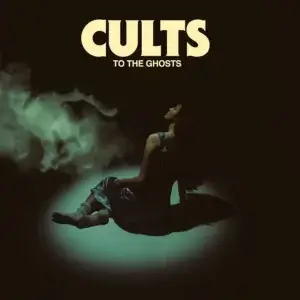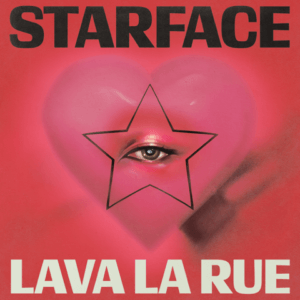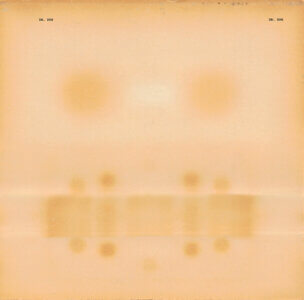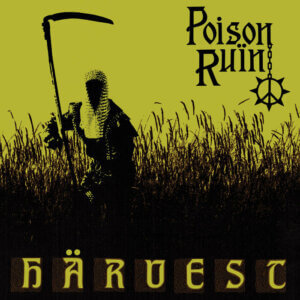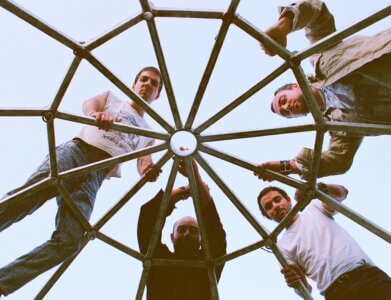Cloakroom fill the void with Dissolution Wave

At first blush, the speed-barrier pushing world of NASCAR racing and the gorgeous-but-glacial space rock of Indiana-based trio Cloakroom’s new Dissolution Wave LP (Relapse) don’t have much in common. For bassist Bobby Markos, who also doubles as a researcher/producer for U.S. television series Lost Speedways, having a foot in both worlds is second nature.
“I grew up in the Chicagoland music scene. I feel like that shaped who I am, but my roots are in auto racing. My dad is a renowned historian and journalist in the industry; my grandfather was going to auto races in Chicagoland after World War II,” he explains.
During some of Cloakroom’s earliest tours, if Markos had been piloting the band van and noticed an abandoned racetrack off the side of the highway, he’d pull over to check it out and maybe take a few photos. He’s returned to a few of those spots with Lost Speedways, which delves into the history of derelict, out-of-service tracks across the United States. Inspired by show host and racing legend Dale Earnhardt Jr.’s habit of nabbing pieces of dirt and asphalt from the locations as mementos, Markos has begun collecting earthy ephemera the same way he would a Cloakroom tour poster.
“I wish when I [had first been] on tour with Cloakroom I had the sense to do [it]. We would’ve had this weird little museum in the back of the van,” Markos says with a laugh before showing off some dirt from Daytona Beach and Road Course, a formative NASCAR spot where 15 land speed records had been smashed before it closed in 1958. “I didn’t have my mason jars, though. Whenever Cloakroom goes back on the road, I’ll bring some pieces of racetrack home with me.”
As for Cloakroom, the band —Markos, vocalist-guitarist Doyle Martin, and new drummer Tim Remis—have wrangled up some of their finest songs yet for Dissolution Wave. Working in extremes, it can find Martin gliding an angelic whisper atop towering, gloom-gaze grooves (“Fear of Being Fixed”), while the band merge ‘90s space rock with Haight-Ashbury-era acid rock (“Dissembler”), or tug heartstrings with an understated, yet effects-warped melody (“A Force At Play”). It’s also a sci-fi concept record where an asteroid miner shoots songs into an interstellar void to protect the Earth.
Speaking with Northern Transmissions, Markos further got into the healing powers of art, and Cloakroom’s speaker-pushing contribution to the sci-fi canon.
This interview has been edited and condensed.
Northern Transmissions: In an earlier interview, Doyle had described your home state of Indiana as a “very barren, desolate place.” Considering Dissolution Wave also takes place in the vast, outer reaches of space, or that you visit these abandoned speedways, what kind of a connection can be made between these three emptied settings?
Bobby Markos: Doyle and I have always said that we’re a product of where we grew up: Northwest Indiana. It’s an industrial zone. All of our ancestors came from Europe to work in the steel mills. We grew up in middle class families; I think we had it in our brains early on, like, “Ok, we’re probably going to work in some kind of a mill,” right? Doyle’s stepdad worked at the mill; my dad, my grandfather, and my great grandfather all worked at the mill. I worked at the mill too after I graduated. We live in Chicagoland, but we don’t live in Chicago, you know. There’s big city influence—some culture— but mostly it’s industrial.
When we got into this lockdown mode [during COVID], we were kind of confined to our homes. Just being in this desolate area, it definitely informed the themes of the record. It influenced what we wrote about. With the Lost Speedways thing, I honestly didn’t really think of it, but it is in some ways an influence [too]. Desolation is something Doyle and I talk about a lot. They’re [the abandoned speedways are] “after people,” you know? It’s the Earth reclaiming its property. I think all those things tie into [Dissolution Wave]. It put Doyle in this post-apocalyptic mindset. The main character is working in this weird Dark Age after culture has died.
NT: Within that theme, the record’s “A Force At Play” is about this asteroid miner writing songs after a hard day’s work, and then filling a literal void with music to keep the Earth from falling off its axis. How does that central sci-fi theme gel with the more grounded element of Cloakroom creating music, perhaps to fill a less literal void?
BM: Obviously the pandemic has been intense. It’s been a long and really crushing few years for humanity, especially for people our age. It’s been really dark. We’re coming of age. We’re realizing the world is not what we were taught it was going to be, and it’s getting worse. But we’re coming to terms with that.
I look at songwriting and art right now, and those are the things that are getting me through it. If I hear a record I really dig, or I see a video that I enjoy, it gives me a little more mileage. It puts some gas in my car to power me through this really dark time. [Within Dissolution Wave], the asteroid miner’s songs are the only sort of light coming from humanity right now. It’s a universal language. In essence, it’s really just about making art that’s good enough that it reaches this platform where everyone can hear it and enjoy it.
NT: There is this arresting, glacial beauty to pieces like Dissolution Wave’s title track or “Fear of Being Fixed,” but what can you say about the feel of “A Force At Play?” It’s this downright beautifully constructed, compact pop song, by comparison.
BM: It was the first song we wrote for this record. I know we were referencing Pavement a lot, just how good Steve Malkmus is at writing pop songs—such an understated songwriting style. I think maybe that was in the back of our heads, but [we wanted to] create a song [with] the Cloakroom dynamic. Like, “what’s the poppiest thing we can do, but also what is the heaviest thing we can do, and how do we put it in one song?” We put that song out first because it was accessible, sure, but [also] because it’s foreshadowing what Dissolution Wave is as a whole: the complete dynamic of Cloakroom’s sound. The prettiest things we can write and the darkest things all in one record.
NT: Dissolution Wave has been described as a space western, at least in the PR. Had Doyle introduced the concept of the album to the band as such?
BM: He never articulated it that way [initially], but that’s how it came out when he was asked to give his two cents on it.
NT: Were you familiar with that specific juxtaposition of genres prior to making the record?
BM: Doyle’s a tastemaker. He’s always had such a funny way of taking two styles of music that don’t really coincide, and finding a way to make them work. We’ve obviously always been really influenced by the space rock movement—bands like Failure, Hum, Spiritualized, or Swervedriver—but by the tail end of [writing 2017’s] Timewell and [into] this record, it’s really been country-and-western influenced. Cloakroom songs are written on acoustic guitars. Before we take them to amplifiers, if you were to throw a mic on them it would sound like Townes Van Zandt. We’ve done stripped-down [live] renditions of heavier songs, too.
I think with space-western, we’re maybe beating journalists to the punch. We found out early on in our existence that it’s kind of hard to put a thumb on what we sound like, so you call us stoner shoegaze, stoner emo, or shroom-gaze—all these weird things. [At least] space-western rolls of the tongue easier.
NT: From a fiction standpoint, how does Dissolution Wave sit within the canon of sci-fi?
BM: This is in no way me just trying to stroke Doyle’s ego, but I was blown away by him coming up with this [concept]. Reading over the lyrics….man, it’s beautiful. I would love to see Doyle turn it into a book. Honestly, I’d like his mind to run wild with it.
But, jeez, we’ve always had copies of Dune lying around, or [1973 French sci-fi film] Fantastic Planet. That stuff has been in the background; we always reference those films. I’m also a huge Kubrick fan, and his flair for sci-fi. That comes out in what we do. I just feel like Doyle’s concept [for Dissolution Wave] is a classic. I’m really impressed and proud of it. It makes the record so much more dimensional for me. It feels larger than life.
Pre-order Dissolution Wave by Cloakroom HERE
Latest Reviews
Tracks
Advertisement
Looking for something new to listen to?
Sign up to our all-new newsletter for top-notch reviews, news, videos and playlists.


